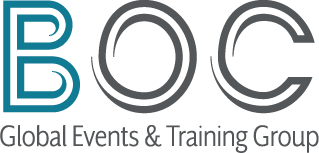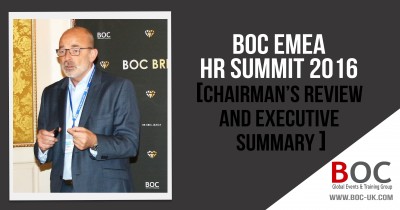
Tom Griffin
Behavioural Strategist & Storyteller
Extraordinary People
———————————————–
In a fascinating couple of days at the EMEA HR Summit 2016 we all went on a wonderfully informative and inspiring journey, and what an experience it was.
As Chairman, I wanted to share my summary of thoughts and insights in the hope that they may re-trigger in you thoughts and inspirations of your own, that you can use to make an immediate difference for you, your people and your organisation.
Gyan Nagpal kicked things off with the encouraging insight that despite the speed of change and innovation (that can at times seem overwhelming), we human beings always rise above the challenges of change to re-invent and re-innovate. Gyan pointed out that the inverse correlation between Change and Difficulty, in truth represent the perfect breeding ground for human innovation. It is in this dynamic that an abundance of opportunities and possibilities appear if we are curious enough to look for them.
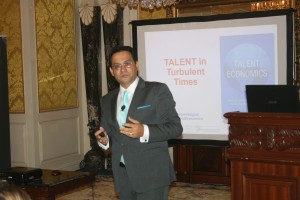 Throughout the two days there were a few references to VUCA (Volatility, Uncertainty, Complexity and Ambiguity), Gyan helped us to see that:
Throughout the two days there were a few references to VUCA (Volatility, Uncertainty, Complexity and Ambiguity), Gyan helped us to see that:
• The bigger the volatility then the bigger the opportunity
• Uncertainty means that by definition the rules are no longer the rules… so have fun and find out just what this shift makes possible.
• With increased complexity comes an explosion of choice, so what will you choose?
• And where there is ambiguity the time is for redefinitions, new codifications and new insights.
A model that Gyan calls the ‘Capacity Spectrum’ showed us that the successful corporate structure of the future will lean much more on what he calls the ‘External Structure’ of third party and agency supply of talent. This increased flexibility and ‘just in time’ supply model being the most effective and efficient response to the sharing economy of 4th industrial revolution.
In all of this the insight was that the more we share and collaborate, the more we discover just what capabilities this new paradigm brings forward. So lets not cut and paste old solutions, let’s innovate and create, let’s become the authors of our own future.
Mohammed Mesbah took us on a wonderful journey into the minds of the millennial generation. He challenged us to look not at the outward show of disconnected ambivalence, but to rather see the truth that these are highly connected, highly engaged people. The truth is that they want to be deeply engaged, but on their terms, not yours.
Once you have engaged them, you have tapped into a deep reservoir of innovation and resourcefulness, that will stand up for what it believes in, whilst being flexible and highly adaptable and hungry for change.
Mohammed and others reinforced the message that by 2025 this group of attitudes and convictions will be representative of 75% of the working population.
But it was his insights into the communication channels and preferences that had most impact. He shared with us that millennials spend 51% of their waking time using their mobile phones and that the by 2020 55% of the information that we all consume will be video based! So its lights, camera, action from now as we all put a lot more focus on what Mohammed called Digital HR!
After three fascinating workshops from Mohammed, Derya Tekin Yusuf, Yetunde Hofmann, Richard Grills encouraged us into action with his call for adaptability and flexibility. His insight that your ability to find people of high potential in your organisation is mainly arbitrated by your ability to spot it and then elicit it. Richard encouraged us to focus on more that just the financial and extrinsic rewards, and to not forget that high performers tend to be even more motivated by intrinsic factors of personal engagement, recognition, freedom and flexibility.
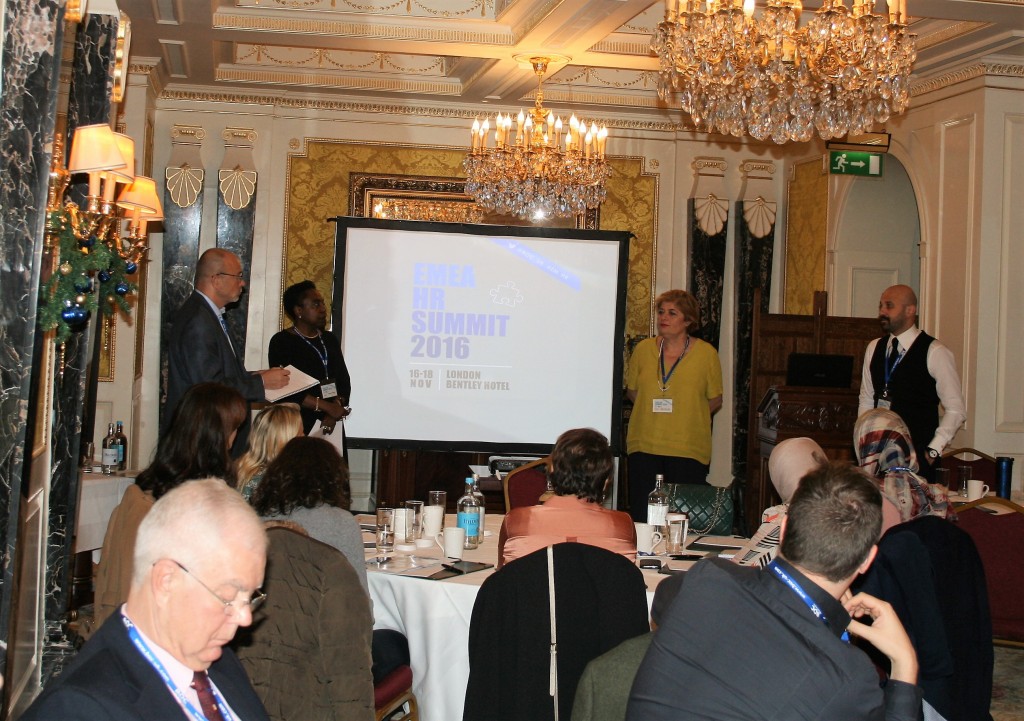
Yetunde Hofmann then brought a whole lot of love into the room with her workshop on the the capability requirements of leadership in the digital age. She challenged us to use our roles in HR to help people to “reach all of who they are”, and to bring a “whole of life” focus to accessing the resources, resourcefulness and engagement of those we work with.
Yetunde also encouraged us to look for and amplify strength over creating organisations of aggregated averages across multiple functions, disciplines and capabilities. She too saw the value and importance of the application of digital technology to people development, to create as she put it, ‘extraordinary’ experiences. The latter of course leads to extraordinary performance both individually and collectively, and challenges all of us to be roles models of this way of being.
In my keynote address before the Brilliance Awards, I pulled these themes together by showing that being extraordinary and becoming a role model of extraordinary performance is simply a matter of choice. We human beings are all already extraordinary and posses within us and around us all of the resources we require to achieve whatever it is we want for ourselves, our people and our whole organisation. No matter what happens, as the tear jerking story of Derek Redmond shows us, we are responsible for how things turn out.
On day two, following the story of how change is a choice and how our attitude toward change fundamentally affects the outcome of change, Tim Highet took us all on a journey right outside of our comfort zones. He challenged us to be comfortable with being uncomfortable, sharing fascinating insights into GE’s move from Six Sigma champion to a culture of freestyle, flexibility that is all about progress rather than perfection. Adaptability rises above predictability, and change is grasped with the appetite of a starving man.
The role of leadership development and the huge investment of time and money that GE puts on this priority shows how it has become the life blood that pumps through the veins of this vast business as it makes itself fit for purpose in the digital age. Its ambition to become the world’s first Digital Industrial Company seems well and truly on track now that it sees itself and probably the worlds latest and longest running start up!
We can all learn from GE’s deep entrenching of beliefs and values, and the spontaneity of the approach to delivering what they call MVP’s (Minimal Viable Products). Given that, as Tim shared, the Apps we use on our smart phones upgrade every 8 days on average, this notion of ‘fix it in flight’ is one that we all actually already subscribe to with little reservation.
Mahmoud Mansi then helped us to recognise that as student we all believed we could do anything, only to discover as we entered the work place that we were expected to do the exact opposite in pursuit of an increasingly blinkered career path. In keeping with Mohammed’s thoughts on millennials, Mahmoud stressed that we have a responsibility to change this restrictive and limiting perspective. In line with Yetunde he believes that we must harness the ‘whole of life’ talents of our people. Our people, he stressed, will make our organisations extraordinary if we have the courage to let them.
He also took on the theme shared by others that encouraging everyone in the organisation to be a role model for each other as both a learner and a coach, will yield huge benefits across all areas of the business. In this way, he told us, leadership becomes everyones job, and helping each other to be the best that we can be becomes the cultural definition of great organisations.
In line with Tim’s attitude to ‘fast failure’ Mahmoud used his beautiful photography to share a very wise message…”Not all mistakes are worth erasing.”
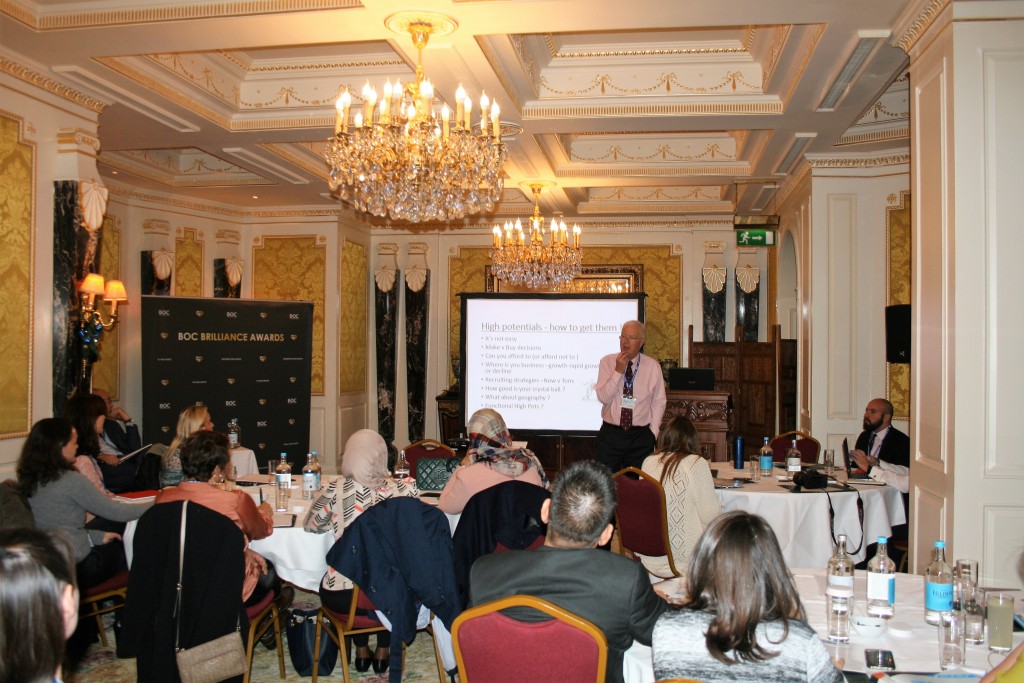
As we moved toward the end of the summit Dr Robert Davies took us all on a fascinating journey into mindfulness. We got to explore known knowns, known unknowns and unknown unknowns as he exposed the all too pragmatic approach of things like balanced score cards and their encouragement of linear thinking.
“One foot in the past and one foot in the present.” he said, “is no way to drive new thinking and curiosity about what might be possible.” Robert tempted us to set our feet at the jumping off point of creativity with one foot in the present and the other in the future.
Armed with the ability to turn unknown unknowns, into known unknowns this path is sure to lead to the sunny uplands of innovation and away from the shadowy foothills of mediocrity that our fear based conscious mind would like us to walk.
Two days of adventuring through the brave new world of HR, and all that is becoming possible for those of us brave enough to take the ride, was given sharp and purposeful focus by Alan Whitford in his workshop on effective recruitment practice. He eloquently brought to the themes of the two days a practical application that could make an immediate difference in a world that is moving oh so fast.
He reminded us that in all of this innovation and change the one constant is people, and that we are in the ‘people business’. “What,” he asked, “would it be like to run HR as a profit centre?” And what will we make happen when we realise that our focus is much more effective when we place it not on what we do, but how we do it.
In closing it seems clear to me that this is such an exciting time for the function of Human Resources. All the innovation and all technologies, all the paradigm shifting, and any amount of millennial mischievousness are in truth enhancements of the one truth that unites us all…people.
All that we discussed has come into being as a result of what people believe and what people do. Al the innovation is in service of what we see as being possible and have the courage to bring into being.
We human beings are extraordinary!
Good luck, and enjoy discovering just how extraordinary you already are.
